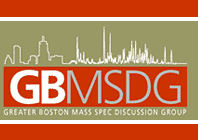GBMSDG Meeting Archives
March 18, 2010
Guest Speaker
Professor Steven Gross
Professor, Department of Pharmacology
Director, Mass Spectrometry Facility
Weill Cornell Medical College
Untargeted Plasma Profiling for Discovery of Metabolic Derangements that Arise from Gene Mutations and Drug Treatments
Location
Hyatt Regency
575 Memorial Drive, Cambridge
Sponsored by
Agilent
Special thanks to Agilent for sponsoring this event. It is the active participation of our sponsors that allows us to keep the fees for membership, dinners, drinks, speakers, etc. so low.
Presentation Abstract
Untargeted plasma metabolite profiling has enormous potential for the diagnosis of conditions that arise from defects in metabolism. Studies will be presented that describe the efficacy of of plasma metabolite profiling for untargeted discovery metabolic defects using a mouse model system and analysis of plasma from human babies with rare inborn errors of metabolism. In mice, we evaluated the capability of an LC/MS-based metabolite profiling platform to broadly survey the plasma metabolome and identify the well-known defect in purine metabolism that results when xanthine oxidoreductase (XOR) is inactivated, either by gene ablation or pharmacological inhibition with allopurinol. Using two distinct chromatographic modes, positive/negative ion monitoring TOF MS and statistical analysis of the resulting data, we were able to confidently survey >3,700 distinct molecular features using < µl of total murine plasma and found that 23 and 26 of these features were altered in expression by >8-fold (up or down) vs. control in xor-knockout and allopurinol-treated mice, despite abundant expression of these features in at least one group (>45,000 ion counts). Searching of differentially-expressed features against an in-house modified METLIN database revealed profound changes in purine metabolism; as expected, knockdown of XOR activity (both genetically and pharmacologically) was associated with a marked increases in xanthine and hypoxanthine levels as well as the disappearance of plasma urate and allantoin relative to control. Associated with predicted changes in purine metabolism, numerous unanticipated changes in metabolism were observed, some readily reconciled and others not. These unanticipated changes cast new light on the functions of XOR and its unappreciated metabolic linkages. In studies of plasma from babies with various rare inborn errors of metabolism, untargeted metabolite profiling was similarly able to identify the predicted metabolite pertubations and suggest gene mutation that reconcile the observed patterns of change. Taken together, these findings affirm the emerging power of untargeted metabolite profiling as an unprecedented tool for biomedical discoveries.
About Steven Gross
Steven S. Gross is Professor of Pharmacology at Weill Cornell Medical College (WCMC), Director of the WCMC Mass Spectrometry Facility and Director of Advanced Training in the Pharmacological Sciences. He earned his PhD degree in Pharmacology from the Mount Sinai School of Medicine (NYC) in 1982. With the exception of two years as Senior Lecturer at St. Bartholomew's Medical College (London, UK; 1991-1993), working with the Nobel Laureate Sir John Vane, Dr. Gross' entire professional career has been at WCMC. Dr. Gross' research has been primarily directed toward elucidating the chemistry, biology and therapeutic modulation of nitric oxide (NO), an important cell-signaling molecule that plays diverse and important roles in mammalian physiology. More recently, research interests of the Gross lab have extended to cancer, stem cell biology, metabolism and the development of new mass spectrometry-based tools for proteomic and metabolomic analyses. This basic research has led to over 25 issued US and foreign patents that provided intellectual property for advancement of new drugs into FDA-sponsored clinical trials. Dr. Gross was a Scientific Founder of ArgiNOx Inc., a biotech start-up with the mission of developing new cardiovascular drugs for therapy of critically-ill patients. He served as a past member of the Board of Directors and Executive Committee of the Cornell Research Foundation (the patenting and licensing arm of Cornell University) and currently is an advisor to the Cornell Center for Technology Enterprise and Commercialization.
